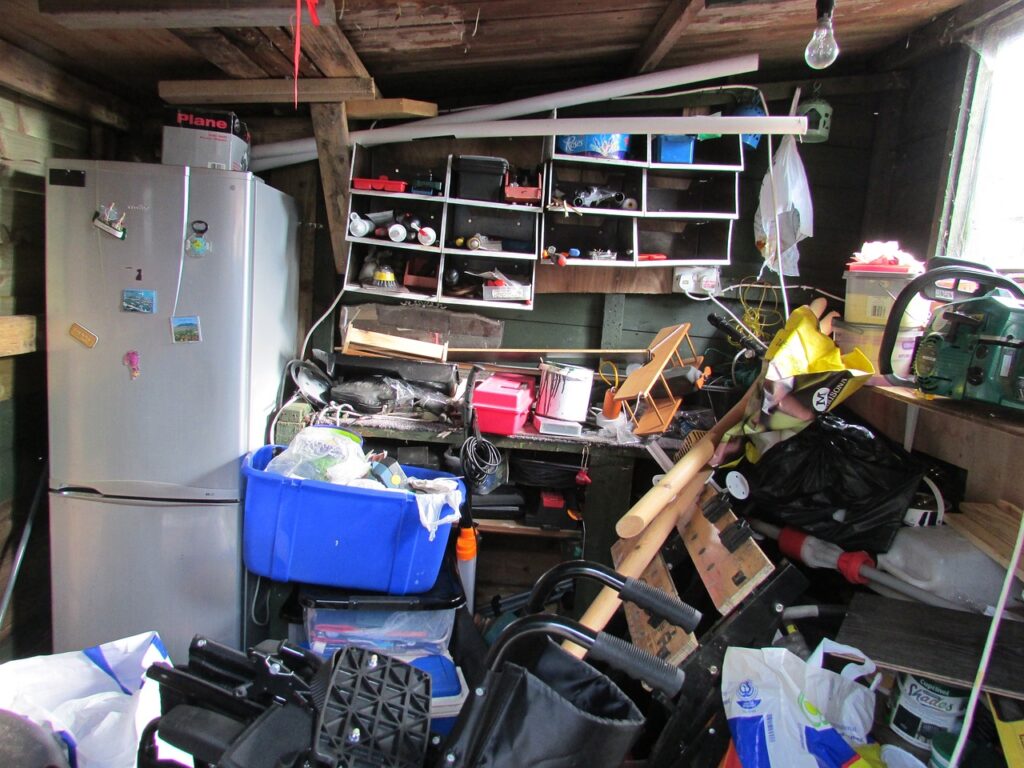Rainy Day Declutter: Organising Your Life in the UK

The British weather is renowned for its unpredictability, often surprising us with a sudden downpour or a prolonged drizzle. While these rainy days might dampen our outdoor plans, they provide the perfect opportunity to focus on indoor activities. One such productive pursuit is decluttering and organising our lives. As we spend more time in our homes, it becomes increasingly important to create a tidy and harmonious environment that promotes efficiency, productivity, and peace of mind.
The importance of decluttering
In this three-part series, we will explore the art of decluttering and offer practical tips specifically tailored to the UK context. Part 1 will focus on the initial steps of decluttering, while Part 2 will delve into effective organisation strategies, and finally, Part 3 will provide guidance on maintaining a clutter-free lifestyle in the long run.
Before we embark on this journey, it’s worth mentioning the importance of seeking professional assistance when dealing with certain aspects of decluttering. For instance, when faced with bulky items, such as those stored in sheds or garages, enlisting the help of a shed clearance company can be a game-changer. In London, where space is often at a premium, shedding unwanted possessions and reclaiming valuable square footage becomes all the more vital.
When it comes to shed clearance in the bustling capital city, there are reputable companies that specialise in this service. A reliable shed clearance company in London can assist you in efficiently and responsibly disposing of items that are no longer needed or have outlived their purpose. They possess the expertise, equipment, and knowledge to handle the task swiftly and effectively, giving you peace of mind and the motivation to tackle the broader decluttering process.
Now that we understand the importance of decluttering and the potential role of a shed clearance company, let’s explore the initial steps of decluttering and how you can make the most of a rainy day to kickstart this transformative process.
Maximising Space and Efficiency
In Part 1 of our Rainy Day Declutter series, we discussed the importance of decluttering and introduced the concept of enlisting a shed clearance company in London to assist with the process. Now, in Part 2, we will delve deeper into effective organisation strategies that will help you maximise space and improve efficiency within your living environment.
1. Categorise and Prioritise
Before diving into the nitty-gritty of decluttering, it’s crucial to establish a systematic approach. Begin by categorising your belongings into distinct groups, such as clothes, books, kitchenware, and sentimental items. This classification will provide a clearer understanding of the areas that require the most attention. Once categorised, prioritise the groups based on urgency or emotional value, ensuring you allocate sufficient time and effort to each category.
2. The Three-Box Rule
The three-box rule is a tried-and-tested method to streamline the decluttering process. As you go through your belongings, label three boxes: “Keep,” “Donate/Sell,” and “Discard.” Be mindful of your emotional attachments and strive to make practical decisions. Items you no longer use or need can be donated to charity, sold, or responsibly disposed of. The three-box rule promotes conscious decision-making and prevents unnecessary clutter from finding its way back into your living spaces.
3. Optimal Storage Solutions
Effective organisation hinges on utilising the available space wisely. In the UK, where homes often have limited square footage, it becomes crucial to invest in optimal storage solutions. From under-bed storage containers to floating shelves and wardrobe organisers, there are numerous options tailored to fit various areas of your home. Take advantage of vertical space, use storage boxes or baskets to corral smaller items, and consider multi-functional furniture that serves as both storage and seating.
4. Room-by-Room Approach
To avoid feeling overwhelmed, tackle the decluttering process room by room. Start with smaller spaces, such as closets or bathrooms, and gradually move towards more significant areas like the kitchen or living room. Breaking down the task into manageable chunks allows for a more systematic and focused approach. Remember to allocate dedicated time for each room and celebrate small victories along the way.
5. Digital Decluttering
In today’s digital age, physical clutter isn’t the only culprit. Our virtual lives also accumulate digital clutter, which can impact productivity and mental well-being. Dedicate time to declutter your digital spaces by organising files, deleting unnecessary emails, and unsubscribing from irrelevant newsletters. Backup important files and photos, and streamline your digital devices for a more streamlined and stress-free digital experience.
Embracing Minimalism and Sustainable Habits
In the previous parts of our Rainy Day Declutter series, we explored the initial steps of decluttering and effective organisation strategies. Now, in Part 3, we will discuss how to maintain a clutter-free lifestyle in the long run. By embracing minimalism and adopting sustainable habits, you can ensure that your efforts to declutter and organise are not in vain.
1. Mindful Consumption
One of the main causes of clutter is excessive consumption. To prevent clutter from accumulating again, it’s essential to practice mindful consumption. Before making a purchase, ask yourself if the item is truly necessary and brings value to your life. Consider the quality, durability, and functionality of the product. By being selective and intentional with your purchases, you can prevent unnecessary clutter from entering your home.
2. Regular Decluttering Sessions
Clutter tends to creep back into our lives over time, even after a thorough decluttering session. To maintain a clutter-free environment, schedule regular decluttering sessions. Set aside dedicated time every few months to re-evaluate your belongings and identify items that are no longer needed or used. This proactive approach will prevent clutter from building up and make future decluttering tasks more manageable.
3. One In, One Out Rule
To maintain a balanced and clutter-free space, adopt the “one in, one out” rule. For every new item you bring into your home, commit to removing a similar item. For example, if you purchase a new sweater, consider donating or discarding an old one. This rule encourages conscious decision-making and prevents unnecessary accumulation of belongings.
4. Storage Maintenance
Organisation is not a one-time task; it requires ongoing maintenance. Regularly assess your storage solutions and ensure they are functioning optimally. Adjust and reorganise as needed, keeping in mind changes in your lifestyle and belongings. Regularly declutter storage spaces, such as closets or drawers, to avoid overcrowding and maintain a sense of order.
5. Embrace Minimalism
Minimalism is a lifestyle choice that promotes intentional living and prioritising experiences over material possessions. By embracing minimalism, you can significantly reduce clutter and create a more streamlined living environment. Evaluate your belongings and keep only the items that truly serve a purpose or bring you joy. Letting go of excess possessions can free up physical and mental space, allowing you to focus on what truly matters.
6. Sustainable Disposal Methods
When decluttering, it’s important to dispose of unwanted items responsibly. In the UK, various options are available for sustainable disposal. Consider donating usable items to local charities, selling them online or through garage sales, or participating in community swap events. For items that cannot be reused, recycle them whenever possible. Utilise recycling facilities or reach out to local authorities for guidance on proper disposal methods.
Bottom Line
Decluttering and organising your life in the UK is a transformative process that can significantly enhance your living environment. By utilising rainy days effectively, seeking the assistance of a shed clearance company in London, and implementing effective organisation strategies, you can create a clutter-free space that promotes productivity, peace of mind, and a sense of harmony.
Start by categorising and prioritising your belongings, using the three-box rule to make conscious decisions about what to keep, donate/sell, or discard. Maximise space and efficiency through optimal storage solutions and a room-by-room approach to decluttering. Don’t forget to extend your efforts to digital spaces, decluttering and organising your digital files and devices.
To maintain a clutter-free lifestyle, practice mindful consumption, regularly schedule decluttering sessions, and adopt the “one in, one out” rule when bringing new items into your home. Regularly maintain your storage solutions, adjust them as needed, and embrace minimalism by letting go of excess possessions. Dispose of unwanted items responsibly, exploring options for donation, selling, or recycling.
By incorporating these practices into your daily life, you can enjoy the benefits of a clutter-free environment, from reduced stress and increased productivity to a greater appreciation for the things that truly matter. Embrace the rainy days as opportunities for transformation, and take proactive steps towards organising your life in the UK.
Remember, decluttering is not a one-time event but an ongoing process. Stay committed, and the rewards of a well-organised and clutter-free home will be well worth the effort. So, grab your boxes, sort through your belongings, and embark on your own rainy day decluttering journey today!





